Irdin Manha Formation
The Irdin Manha Formation is a geological formation from the Eocene located in Inner Mongolia, China, a few kilometres south of the Mongolian border.[1]
| Irdin Manha Formation | |
|---|---|
| Stratigraphic range: Eocene | |
| Type | Geological formation |
| Location | |
| Coordinates | 43.7°N 112.0°E |
| Region | Inner Mongolia |
| Country | |
| Approximate paleocoordinates | 45.2°N 105.7°E |
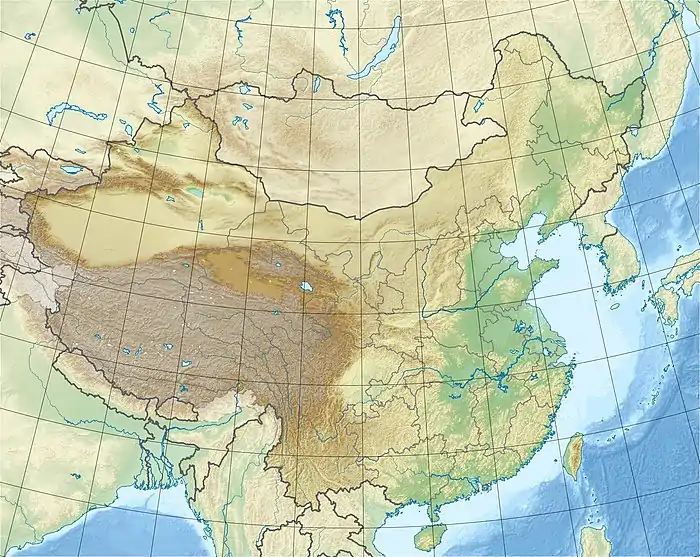 Irdin Manha Formation (China) | |
Fossil content
Color key
|
Notes Uncertain or tentative taxa are in small text; |
Mammals
U.S. paleontologists Henry Fairfield Osborn and Roy C. Andrews discovered two premolars on the site in 1923, and assigned the specimen to the new genus Eudinoceras because he believed it to be related to "Dinoceras" (now known as Uintatherium). Within a decade, however, as more complete specimens were recovered, the animal was identified as a Mongolian relative to the North American pantodont Coryphodon. The expedition also lead to the discovery of the only known skull of Andrewsarchus.[2]
Artiodactyls
| Artiodactyls reported from the Irdin Manha Formation | |||||
|---|---|---|---|---|---|
| Genus | Species | Presence | Material | Notes | Images |
| Achaenodontidae? | An incomplete upper tooth (AMNH 20136).[3] | Doubtfully assigned to the family. | |||
| Cf. Archaeomeryx, gen indet. | Fragment of lower jaw (AMNH 20173).[3] | A traguliform. | |||
| Andrewsarchus | A. mongoliensis | Around Telegraph Line Camp.[4] | A large skull.[5] | A relative of entelodonts formerly thought to be a mesonychid. | 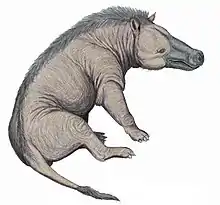 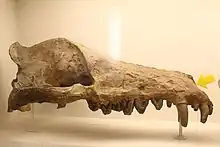 |
| Erlianhyus | E. primitivus | Irdin Manha, Erlian Basin, Nei Mongol.[6] | A right upper maxilla with P3–M3 (IVPP V 28275).[6] | A basal artiodactyl. | |
| Gobiohyus | G. orientalis | Telegraph Line Camp.[7] | Jaw elements.[3][7] | A helohyid also found in the Ulan Shireh Formation. | |
| G. pressidens | Telegraph Line Camp.[7] | Partial right rami.[3][7] | A helohyid. | ||
| G. robustus | Telegraph Line Camp.[7] | Left ramus (AMNH 20246).[3][7] | A helohyid. | ||
| Obotherium | O. parvum | Irdin Manha, Erlian Basin, Nei Mongol.[8] | Teeth and lower jaws[8] | A tapirulid. | |
Cimolestans
| Cimolestans reported from the Irdin Manha Formation | |||||
|---|---|---|---|---|---|
| Genus | Species | Presence | Material | Notes | Images |
| Eudinoceras | E. mongoliensis | 2 premolars & jaw elements.[2][3][9] | A coryphodontid. | ||
Dinoceratans
| Dinoceratans reported from the Irdin Manha Formation | |||||
|---|---|---|---|---|---|
| Genus | Species | Presence | Material | Notes | Images |
| Gobiatherium | G. mirificum | 25 miles southwest from Iren Dabasu.[2] | Skull, jaws & limb elements.[2] | An uintatheriid. | 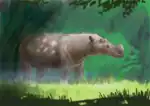 |
Ferae
| Ferae reported from the Irdin Manha Formation | |||||
|---|---|---|---|---|---|
| Genus | Species | Presence | Material | Notes | Images |
| Miacis | M. invictus | Isolated upper molar (AMNH 20137).[3] | A miacid. | 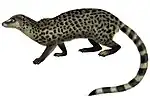 | |
| Propterodon | P. irdinensis | Jaw fragments.[3] | A hyaenodontid. | ||
| Sarkastodon | S. mongoliensis | About 25 miles southwest of Iren Dabasu.[10] | Skull & jaws.[10] | An oxyaenid. |  |
Glires
| Glires reported from the Irdin Manha Formation | |||||
|---|---|---|---|---|---|
| Genus | Species | Presence | Material | Notes | Images |
| Advenimus | A. burkei | Near Camp Margetts.[11] | Jaw elements.[11] | A ctenodactyloid rodent. | |
| Asiomys | A. dawsoni | Huheboerhe.[12] | Fragment of right calcaneus (IVPP V24417).[12] | An ischyromyid rodent. | |
| Erenlagus | E. anielae | Huheboerhe.[13] | Teeth.[13] | A stem-lagomorph. | |
| Gomphos | G. shevyrevae | Huheboerhe escarpment.[14] | Teeth & foot elements.[14] | A mimotonid. | |
| Ischyromyidae genus indet. | Species A | Irdin Manha escarpment.[12] | Right calcaneus (IVPP V24416).[12] | Relatively large ischyromyid rodent, calcaneus comparable in size to that of a coypu or Asiatic brush-tailed porcupine.[12] | |
| Species B | Daoteyin Obo.[12] | Right calcaneus (IVPP V24418).[12] | Large ischyromyid rodent with calcaneus matching in length that of a coypu & similar in structure to that of Paramys.[12] | ||
| Mimolagus | M. aurorae | Irdin Manha escarpment.[15] | Teeth & foot elements.[15] | A large mimotonid. | |
| Pappocricetodon | P. neimongolensis | Huheboerhe.[16] | Teeth.[16] | A cricetid rodent. | |
| P. cf. P. zhongtiaensis | Huheboerhe.[16] | A left molar.[16] | A cricetid rodent. | ||
| P. sp. | Huheboerhe.[16] | A right molar.[16] | A cricetid rodent. | ||
| Paramyidae | Paramyid spp. | Teeth & jaws.[11] | 3 sizes of paramyid rodents, possibly different species. | ||
| ?Paramyid sp. | Left jaw (AMNH 80801).[11] | Possible small paramyid rodent. | |||
| Simplicimys | S. bellus | Huheboerhe.[17] | Teeth.[17] | A ctenodactyloid rodent also known from the Arshanto Formation. | |
| Strenulagus | S. solaris | Irdin Manha and Huheboerhe localities.[18] | Isolated cheek teeth, fragmentary upper incisors (dI2) and postcranial elements.[18] | A stem-lagomorph also known from the Khaychin Formation. | |
| Tamquammys | T. fractus | Huheboerhe.[17] | Right maxilla (V17798).[17] | A ctenodactyloid rodent. | |
| T. wilsoni | Teeth.[17] | A ctenodactyloid rodent also known from the Arshanto & Nomogen formations. | |||
| Yongshengomys | Y. extensus | Huheboerhe.[17] | Teeth.[17] | A ctenodactyloid rodent. | |
| Yuomys | Y. huheboerhensis | Huheboerhe.[17] | Teeth.[17] | A ctenodactyloid rodent. | |
| Y. sp. A | Huheboerhe.[17] | A right molar (V17805).[17] | A ctenodactyloid rodent. | ||
| Y. sp. B | Huheboerhe.[17] | A right molar (V17806).[17] | A ctenodactyloid rodent. | ||
| Y. sp. C | Huheboerhe.[17] | A right molar (V17807).[17] | A ctenodactyloid rodent. | ||
Mesonychians
| Mesonychians reported from the Irdin Manha Formation | |||||
|---|---|---|---|---|---|
| Genus | Species | Presence | Material | Notes | Images |
| Hapalodectes | ?H. auctus | An upper molar or possibly premolar (AMNH 20130).[3] | A hapalodectid. | ||
| H. serus | Around Telegraph Line Camp.[4] | Lower cheek tooth (AMNH 20172).[3][4] | A hapalodectid. | 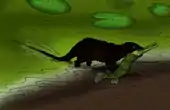 | |
| Harpagolestes | H. leei | Huheboerhe & Daoteyin Obo.[19] | Tooth elements.[19] | A mesonychid. | |
| Mesonychidae | Gen. indet. | AMNH 20132.[3] | About the size of Harpagolestes uintensis. | ||
| Gen. indet. | Isolated tooth (AMNH 20133).[3] | About the size of Synoplotherium lanius. | |||
| Mongolonyx | M. dolichognathus | 7 miles west of Camp Margetts.[4] | Jaw elements.[4] | A large mesonychid. | |
Perissodactyls
| Perissodactyls reported from the Irdin Manha Formation | |||||
|---|---|---|---|---|---|
| Genus | Species | Presence | Material | Notes | Images |
| Caenolophus | C. proficiens | Lower jaw & isolated teeth.[20] | A rhinocerotoid. | ||
| Cooperia | C. totadentata | Telegraph Line Camp, 23 miles southeast of Iren Dabasu.[21] | Front of skull (AMNH 20116).[21] | Generic name preoccupied, renamed Forstercooperia. | |
| Desmatotherium | D. fissum | Upper jaw fragment.[20] | A helaletid. | ||
| D. mongoliense | Irdin Manha escarpment, Duheminboerhe, Huheboerhe & Chaganboerhe.[22] | Parts of 10 individuals.[20][23] | A helaletid also found in the Mergen Formation. | ||
| Forstercooperia | F. totadentata | Telegraph Line Camp, 23 miles southeast of Iren Dabasu.[21] | Front of skull (AMNH 20116).[21] | A paraceratheriid, originally named Cooperia. | 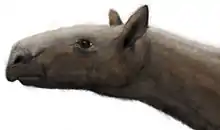 |
| F. ulanshirehensis | Irdin Manha site.[24] | Jaw elements.[24] | A paraceratheriid also known from the Ulan Shireh Formation. | ||
| Gnathotitan | G. berkeyi | Irdin Manha.[25] | Jaw elements.[25] | A brontothere. | 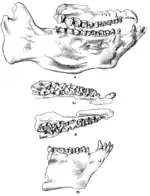 |
| Lophialetes | L. expeditus | Jaw elements.[20] | A lophialetid. | ||
| L. minutus | Upper molar.[20] | A lophialetid. | |||
| Metatelmatherium | M. cristatum | Camp Margetts.[25] | Skull & lower jaw (AMNH 26411).[25] | A brontothere. | |
| M. parvum | Irdin Manha.[25] | Fragment of left lower jaw (AMNH 20168).[25] | A brontothere. | ||
| Microtitan | M. mongoliensis | Jaw elements.[25] | A brontothere. | ||
| Pappaceras | P. confluens | Upper gray clays & Camp Margetts area.[26] | Skull & jaw elements.[26] | A paraceratheriid. | |
| Paracolodon | P. fissus | Duheminboerhe & Daoteyin Obo.[22] | Skull elements & teeth.[22] | A helaletid. | |
| Protitan | P. bellus | Spring Camp, East Mesa, Shara Murun region.[25] | Palatal side of skull (AMNH 26104).[25] | A brontothere. | |
| P. grangeri | Skull elements.[25] | A brontothere. | |||
| P. minor | Camp Margetts.[25] | Skull elements.[25] | A brontothere. | ||
| P. obliquidens | Irdin Manha.[25] | Part of left maxilla (AMNH 20125).[25] | A brontothere. | ||
| P. robustus | Irdin Manha.[25] | Jaw elements & teeth.[25] | A brontothere. | ||
| Protitanotherium | P. mongoliense | Lower jaw & foot bones (AMNH 18653).[23] | Moved to the genus Rhinotitan.[25] | 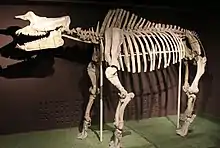 | |
| Rhinotitan | R. mongoliensis | Lower jaw & foot bones (AMNH 18653).[23] | A brontothere originally reported as a species of Protitanotherium. | 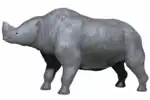 | |
| Rostriamynodon | R. grangeri | East of Camp Margetts.[27] | Complete skull & mandible (AMNH 107635).[27] | An amynodontid. | |
| Teleolophus | T. medius | Teeth & jaws.[20] | |||
Primates
| Primates reported from the Irdin Manha Formation | |||||
|---|---|---|---|---|---|
| Genus | Species | Presence | Material | Notes | Images |
| Tarkops | T. mckennai | Huheboerhe.[28] | Incomplete left lower jaw (IVPP V16424).[28] | An omomyid. | |
Birds
| Birds reported from the Irdin Manha Formation | |||||
|---|---|---|---|---|---|
| Genus | Species | Presence | Material | Notes | Images |
| Buteoninae | Chimney Butte.[29] | Left coracoid (AMNH FR 2941).[29] | Specimen reassigned to Eogrus? sp. | ||
| Eogrus | E. aeola | Chimney Butte.[29] | Right metatarsus (AMNH 2936).[29] | An eogruid. | |
| E.? sp. | Chimney Butte.[29] | Left coracoid (AMNH FR 2941).[29] | Formerly thought to represent a buteonine, now thought to be an eogruid.[30] | ||
| Telecrex | T. grangeri | Chimney Butte, Shara Murun region.[29][31] | An incomplete right femur (AMNH 2942).[29][31] | A guineafowl, formerly thought to be a rail. | |
Crocodilians
| Crocodilians reported from the Irdin Manha Formation | |||||
|---|---|---|---|---|---|
| Genus | Species | Presence | Material | Notes | Images |
| Asiatosuchus | A. grangeri | 25 miles southwest of Iren Dabasu.[32] | Portions of at least 2 individuals.[32] | A crocodyloid. | |
Testudines
| Testudines reported from the Irdin Manha Formation | |||||
|---|---|---|---|---|---|
| Genus | Species | Presence | Material | Notes | Images |
| "Adocus" | "A". orientalis | Telegraph Line Camp.[33][34] | Anterior half of plastron (AMNH 6356).[33][34] | An adocid. | |
| Amyda? | A.? johnsoni | Telegraph Line Camp.[34] | Two-thirds of a carapace (AMNH 6357) & many carapace fragments (AMNH 6359).[34] | A softshell turtle. | |
| Trionychidae | Indeterminate | Telegraph Line Camp.[34] | Several kinds of sculptured fragments (AMNH 6360).[34] | Remains of softshell turtles. | |
Fish
| Fish reported from the Irdin Manha Formation | |||||
|---|---|---|---|---|---|
| Genus | Species | Presence | Material | Notes | Images |
| Pappichthys | P. mongoliensis | Telegraph Line Camp.[35] | Vertebrae.[36] | Specimens now believed to represent Siluriformes. | |
| Siluriformes | Indeterminate | Telegraph Line Camp, Chahar Province.[35] | 5 vertebrae (AMNH 8535).[35] | A catfish likely related to ictalurids. Formerly assigned to Pappichthys mongoliensis. | |
See also
References
- Irdin Manha Beds (1930 AMNH Eudinoceras site) (Eocene of China) in the Paleobiology Database. Retrieved July 2013.
- Osborn, Henry Fairfield; Granger, Walter (August 17, 1932). "Coryphodonts and uintatheres from the Mongolian Expedition of 1930". American Museum Novitates (552): 1–16. hdl:2246/3000.
- Matthew, William Diller; Granger, Walter (November 21, 1925). "New mammals from the Irdin Manha Eocene of Mongolia". American Museum Novitates (198): 1–10. hdl:2246/3182.
- Szalay, Frederick S.; Gould, Stephen Jay (1966). "Asiatic Mesonychidae (Mammalia, Condylarthra)". Bulletin of the AMNH. 132 (2). hdl:2246/1112.
- Osborn, H. F. (11 November 1924). "Andrewsarchus, giant mesonychid of Mongolia" (PDF). American Museum Novitates. American Museum of Natural History (146). Archived from the original on 2 November 2020.
- Li, Qian; Li, Qi (2022-10-03). "A new middle Eocene bunodont artiodactyl from the Erlian Basin (Nei Mongol, China)". Historical Biology. 34 (10): 1941–1949. doi:10.1080/08912963.2021.1989679. ISSN 0891-2963. S2CID 239828310.
- Coombs, Margery C.; Coombs, Walter P. (1977). "Dentition of Gobiohyus and a Reevaluation of the Helohyidae (Artiodactyla)". Journal of Mammalogy. 58 (3): 291–308. doi:10.2307/1379328. ISSN 0022-2372. JSTOR 1379328.
- Bai, Bin; Wang, Yuan-Qing; Theodor, Jessica M.; Meng, Jin (2023). "Small artiodactyls with tapir-like teeth from the middle Eocene of the Erlian Basin, Inner Mongolia, China". Frontiers in Earth Science. 11. doi:10.3389/feart.2023.1117911. ISSN 2296-6463.
- Osborn, Henry Fairfield; Granger, Walter; Andrews, Roy Chapman; Matthew, William Diller (1931). "Coryphodonts of Mongolia: Eudinoceras mongoliensis Osborn, E. kholobolchiensis sp. nov". American Museum Novitates (459). hdl:2246/3066.
- Granger, Walter; Garber, A. Z. (April 21, 1938). "A giant oxyaenid from the Upper Eocene of Mongolia". American Museum Novitates (969): 1–5. hdl:2246/2199?show=full.
- Dawson, Mary (1964). "Late Eocene rodents (Mammalia) from Inner Mongolia". American Museum Novitates (2191). hdl:2246/3304.
- Fostowicz-Frelik, Łucja; López-Torres, Sergi; Li, Qian (2021-06-02). "Tarsal morphology of ischyromyid rodents from the middle Eocene of China gives an insight into the group's diversity in Central Asia". Scientific Reports. 11 (1): 11543. Bibcode:2021NatSR..1111543F. doi:10.1038/s41598-021-90796-1. ISSN 2045-2322. PMC 8172891. PMID 34078948.
- Fostowicz-Frelik, Łcja; Li, Qian (2014-12-31). "A new genus of stem lagomorph (Mammalia: Glires) from the Middle Eocene of the Erlian Basin, Nei Mongol, China". Acta Zoologica Cracoviensia. 57 (1): 29–42. doi:10.3409/azc.57_1-2.29. ISSN 0065-1710.
- Meng, Jin; Kraatz, Brian P.; Wang, Yuanqing; Ni, Xijun; Gebo, Daniel L; Beard, K. Christopher (2009-11-30). "A New Species of Gomphos (Glires, Mammalia) from the Eocene of the Erlian Basin, Nei Mongol, China". American Museum Novitates (3670): 1–11. doi:10.1206/673.1. ISSN 0003-0082.
- Fostowicz-Frelik, Łucja; Li, Chuankui; Mao, Fangyuan; Meng, Jin; Wang, Yuanqing (2015-03-30). "A large mimotonid from the Middle Eocene of China sheds light on the evolution of lagomorphs and their kin". Scientific Reports. 5 (1): 9394. doi:10.1038/srep09394. ISSN 2045-2322. PMC 4377629. PMID 25818513.
- Li, Qian (July 2012). "Middle Eocene Cricetids (Rodentia, Mammalia) from The Erlian Basin, Nei Mongol, China". Vertebrata PalAsiatica. 50 (3): 237–244.
- Li, Qian; Meng, Jin (2015). New ctenodactyloid rodents from the Erlian Basin, Nei Mongol, China, and the phylogenetic relationships of Eocene Asian ctenodactyloids. New York, NY: American Museum of Natural History.
- Łucja, Fostowicz-Freldc; Chuankui, Li; Qian, Li; Jin, Meng; Yuanqing, Wang (March 3, 2015). "Strenulagus (Mammalia: Lagomorpha) from the Middle Eocene Irdin Manha Formation of the Erlian Basin, Nei Mongol, China". Acta Geologica Sinica - English Edition. 89 (1): 12–26. doi:10.1111/1755-6724.12391. S2CID 128886984.
- Jin, Xun (July 2012). "New mesonychid (Mammalia) material from the lower Paleogene of the Erlian Basin, Nei Mongol, China". Vertebrata PalAsiatica. 50 (3): 245–257.
- Matthew, William Diller; Granger, Walter (November 23, 1925). "The smaller perissodactyls of the Irdin Manha Formation, Eocene of Mongolia". American Museum Novitates (199): 1–9. hdl:2246/3183.
- Wood, Horace Elmer (December 30, 1938). "Cooperia totadentata, a remarkable rhinoceros from the Eocene of Mongolia". American Museum Novitates (1012): 1–20. hdl:2246/2209?show=full.
- Bai, Bin (2017). New material of Eocene Helaletidae (Perissodactyla, Tapiroidea) from the Irdin Manha Formation of the Erlian Basin, Inner Mongolia, China, and comments on related localities of the Huheboerhe area. American Museum of Natural History Library. New York, NY : American Museum of Natural History.
- Osborn, Henry Fairfield (October 17, 1923). "Titanotheres and lophiodonts in Mongolia". American Museum Novitates (91): 1–5. hdl:2246/3206.
- Wang, Hai-bing; Wang, Hai-bing; Bai, Bin; Meng, Jin; Wang, Yuanqing (2018). A new species of Forstercooperia (Perissodactyla, Paraceratheriidae) from northern China with a systematic revision of forstercooperiines. New York, NY: American Museum of Natural History.
- Granger, Walter; Gregory, William K. (February 4, 1943). "A revision of the Mongolian titanotheres". Bulletin of the AMNH. 80 (10): 349–389. hdl:2246/383.
- Wood, Horace Elmer (July 25, 1963). "A primitive rhinoceros from the late Eocene of Mongolia". American Museum Novitates (2146): 1–11. hdl:2246/3390.
- Wall, William P.; Manning, Earl (1986). "Rostriamynodon grangeri n. gen., n. sp. of Amynodontid (Perissodactyla, Rhinocerotoidea) with Comments on the Phylogenetic History of Eocene Amynodontidae". Journal of Paleontology. 60 (4): 911–919. doi:10.1017/S0022336000043079. ISSN 0022-3360. JSTOR 1305081. S2CID 59363111.
- Ni, Xijun; Meng, Jin; Beard, K. Christopher; Gebo, Daniel L.; Wang, Yuanqing; Li, Chuankui (2010-01-22). "A new tarkadectine primate from the Eocene of Inner Mongolia, China: phylogenetic and biogeographic implications". Proceedings of the Royal Society B: Biological Sciences. 277 (1679): 247–256. doi:10.1098/rspb.2009.0173. ISSN 0962-8452. PMC 2842661. PMID 19386655.
- Wetmore, Alexander (1934). "Fossil birds from Mongolia and China". American Museum Novitates (711): 1–16. hdl:2246/2095.
- "Division of Paleontology". research.amnh.org. Retrieved 2023-02-05.
- Olson, S. (1974). "Telecrex Restudied: A Small Eocene Guineafowl". The Wilson Journal of Ornithology. 86 (3): 246–250. S2CID 73581614.
- Mook, Charles Craig (1940). "A new fossil crocodilian from Mongolia". American Museum Novitates (1097): 1–3. hdl:2246/2242.
- Danilov, I. G.; Sukhanov, V. B.; Syromyatnikova, E. V. (2011). "New Asiatic materials on turtles of the family Adocidae with a review of the Adocid record in Asia". Proceedings of the Zoological Institute RAS. 315 (2): 101–132. doi:10.31610/trudyzin/2011.315.2.101. S2CID 55392207.
- Gilmore, Charles W. (1931). "Fossil turtles of Mongolia". Bulletin of the AMNH. 59 (4). hdl:2246/345.
- Stucky, Richard K. (1982). "Early Fossil Catfish from Mongolia". Copeia. 1982 (2): 465–467. doi:10.2307/1444634. ISSN 0045-8511. JSTOR 1444634.
- Hussakof, Louis; Granger, Walter (1932). "The fossil fishes collected by the Central Asiatic Expeditions". American Museum Novitates (553). hdl:2246/3001.
This article is issued from Wikipedia. The text is licensed under Creative Commons - Attribution - Sharealike. Additional terms may apply for the media files.